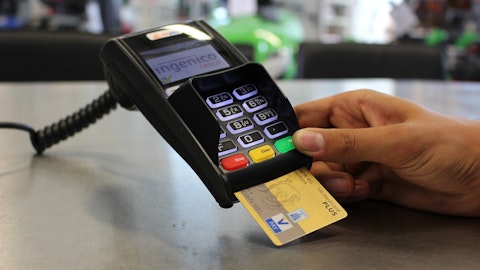Every dollar we process contributes to our profit. What we said is that at a gross profit level, which is the key metric we keep track of internally, this will be neutral if not positive. Let me explain why. The gap in the FX in Nigeria made it very hard for merchants to understand why there was an official market rate and there was the market rate and why they had to navigate a lot of that complexity, some of that complexity is now sold. So for our global merchants, it’s now easier to navigate this country, and we expect that to be one, neutral to positive from a gross profit standpoint, but two, obviously accretive to our margin structure. We spoke about our margin being punished before, given our Nigeria business. Now we probably get some upside from it.
Maria, feel free complement on this point, please.
Pedro Arnt: Yeah, the only thing I would add is that not only it’s not zero, it’s actually profitability higher than average net margin rates in the country.
Sebastian Kanovich: Guilherme, on your second question on the financial profile, Maria, do you want to take it?
Diego Cabrera Canay: So, sure. We had in the quarter roughly $7.4 million of financial profits that is basically the result of higher — or having higher amounts of cash in local markets, in countries like Brazil or Argentina, as you mentioned. Part is the bond. As you mentioned, like roughly $2 million, $3 million is results of the bond, but mostly in money markets and interest bearing accounts that we have in those countries that generate cash. We use part of those process — profits to invest in hedges to be fully covered, and that is the cost — the financial cost that you see in the P&L. The net of those two has been very positive in the quarter. Over the medium term, that should sequentially go back to a lower number. But particularly this quarter, we had these situations where we have a significant amount of cash invested, also at the operating company level with higher interest rates.
Guilherme Grespan: Just a follow-up if I may, how much those bonds, Argentinian bonds are paying?
Diego Cabrera Canay: So they are mark-to-market. The interest rate — the nominal interest rate on the bond is minimal at 0.4% because they are dollar linked but it’s mainly the result of the mark-to-market of that bond. But again, out of the financial income of the quarter, only a small portion of that is the bond. Most of the financial income is a result of cash held in money markets are interest-bearing accounts, I would say in Brazil, Argentina and at the operating company level.
Sebastian Kanovich: Guilherme, I would like to complement on the Nigeria question just to make sure this is clear. When there’s a devaluation, two things happened, our gross take rate goes down, but our cost of processing goes down. So that’s why you see this being neutral at a gross profit level. Our cost of expatriation will decline heavily in the same amount as our gross revenue will decline because those are a function of the spread between the official market rate and the market risk. So that’s why you see this being echoed. I hope that’s clear. I know it’s complex, but I want to make sure this is properly understood.
Guilherme Grespan: Yeah, sure. It was clear. Thank you for the answers.
Sebastian Kanovich: Appreciate it.
Operator: Thank you. Our next question comes from Ashwin Shirvaikar with Citi. Your line is open.
Ashwin Shirvaikar: Hi, can you hear me?
Sebastian Kanovich: Yes.




